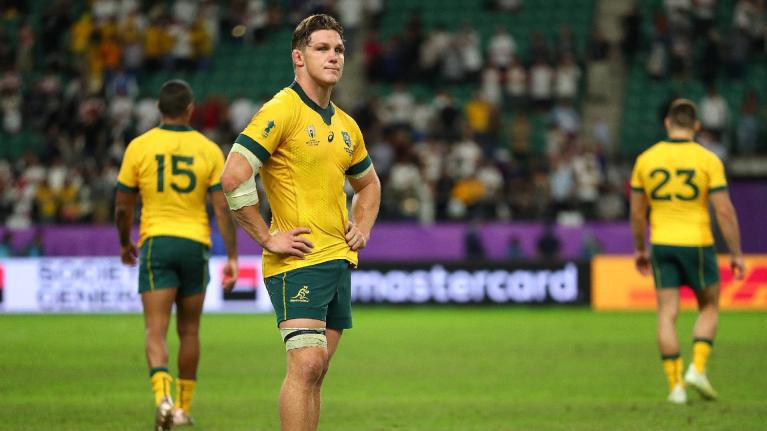It's time for Rugby Australia to look at themselves

Saturday October 19, 2019. England 40-16 Australia. A day when reality and delusion met for the highest echelons of Australian rugby.
The delusion - four years of rhetoric from failed Wallabies coach Michael Cheika further espoused by Rugby Australia essentially stating that that the Wallabies were heading in the right direction.
The reality – they simply were not good enough and have not been in the four-year World Cup cycle since 2015.
While it is easy to become vultures of opinion, picking over what little scraps are left of the dead Wallaby carcass after the weekend's mauling at the hands of England, it is vitally important to understand the signposts of failure have been present for some time, that the Wallabies were living in an alternate rugby dimension void of reality prior to their exit from the World Cup.
In 2016, a humiliating 3-0 home series defeat to England; in 2017 a 2-1 home series defeat to Ireland, two losses to Scotland coupled with defeats to Wales and Argentina, sides that the Wallabies had previously enjoyed superiority over were cogent evidence that the Wallabies were failing not forging ahead as the rhetoric may have suggested.
Continue reading below...
Some may point to the Wallabies defeat of the All Blacks 47-26 in Perth during this year’s Rugby Championship to refute such a slide, yet the reality is it was a one-off victory where Australia faced a New Zealand side that were not mentally attuned for that game, and when they faced off at Eden Park a week later in the Bledisloe decider, water found its level and the Wallabies were humiliated 36-0 by an All Blacks team who this time came to play.
Although Cheika has several great attributes as a coach, including passion, loyalty and desire, a legacy of his tenure as Wallabies coach will be his abject failure to take Australia from unlikely World Cup runners-up in 2015 and progress them into a serious global powerhouse.
Complicit in such an outcome has been Rugby Australia, who have also adjectively failed to curb the rot and allowed Michael Cheika and his Wallabies to master mediocrity in this World Cup cycle.
It would appear prior to leaving for Japan, RA, Cheika and the Wallabies would have you believe that there was a united front heading towards Rugby World Cup 2019.
The reality is, as it has now been made public, that RA chief executive Raelene Castle and Cheika don’t really have a working relationship, and Cheika’s relationship with Cameron Clyne, chairman of the union, does not appear much better.
The first question is why?
The second question is how long have these relationships been allowed to deteriorate?
The third being what affect has this souring of relationships between the parties had on the Wallabies and Australian rugby?
In any event, any business worth its salt should not be appearing united to its shareholders selling the ‘all is well message’, when the truth is that all is far from well at the higher echelons of RA.
There appears to be a lack of both moral courage and an ability to act upon it in a timely manner woven into the administration of the game of rugby in Australia.
They appear to be an organisation that champions diversity but no transparency. The mediocre performance of the Wallabies at this World Cup is the fruit such duplicity bears.
RA can point to the recent performances of the Australian U18 side's defeat of New Zealand 18-14 in Hamilton last month, but that is only the fourth time the Australians have won since 2008, while the U20’s painful 24-23 loss to France in the final of this year’s World Rugby Championship was the first time they have made the final since 2010.
Both sides deserve praise, but can anyone argue that there is evidence of sustained generational improvement in junior Australian rugby?
Some elder statesmen of Australian rugby have been quietly arguing for now decades that since the abandonment of the National Coaching Committee in 1996, the nation has declined in its skill base, and such a loss is ultimately affecting the Wallabies' performances.
Former Wallabies skipper and twice World Cup-winner Phil Kearns is in unison with such thinking when he stated on Fox Sports: "Our coaching for the last 15-20 years has been terrible, not just at Wallaby level, I'm talking about juniors and the skills that we teach them, the way we ask them to play the game.
"We teach this shape and pattern and structure and process which is all rubbish, because if you can't catch and pass and kick and tackle, you can’t play the game."
"
"
If these comments are not in conflict with each other, they certainly invite incoherence to the audience.
He wants to win the way Australians desire, whatever that is, yet won’t entertain a kick-defend game, but does not want to play one style of rugby all-around. It is as confusing as his selection policy.
"6096133981001"]
Latest Comments
This review highlights the effective recovery of lost cryptocurrency assets, particularly through the expertise of RUDER CYBER TECH SLEUTHS. Their advanced programs enable the tracing and retrieval of crypto tokens mistakenly sent to scammers. Before contacting RUDER CYBER TECH SLEUTHS, I didn't realize recovery was possible, but their professionalism and dedication have reshaped my outlook. They deserve greater recognition for their exceptional service and commitment to helping clients recover lost assets.
Go to commentsMy name is Graham Paterson. I am coping fine . Ardie Savea and Moana Pasfifika deserved there victory. The outstanding David Havili was missed .I think , if you leave out Christian Lio-Willie , who has been so good. Best if Tom Christie starts with Ethan Blackadder and Cullen Grace. Mitchell Drummond too at 9. Some of those guys were short of a gallop against a fired up Pasifika.
Go to comments